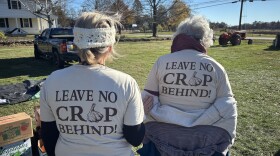-
Climate change has caused unpredictable and unseasonably warm winters in recent years, but this season is reliably cold so far in New Hampshire. Will it last?
-
Anna Wallingford is an entomologist by training. She wants to be a resource for farmers, gardeners and homesteaders who are curious about environmentally-friendly pest management. She calls it "a CSA, but for science."
-
The bringer of daylight, the bringer of death, and one of the coolest, most underestimated birds around.
-
With a blanket of white, you can really get a look at the bones of your garden and think about garden design principles and plans.
-
For some birds, warmer weather is bringing marital problems.
-
Nuclear power faced major opposition in New Hampshire in the 1970s. Half a century later, Ayotte wants to make the state the face of nuclear innovation.
-
The Hillsborough County Gleaners serve about 6,000 families each week. They say demand has surged in recent months.
-
In County Leitrim, an area of Ireland hit hard by the Troubles and the Great Famine, townspeople are fighting what they say is a new wave of colonialism: Sitka spruce plantations.
-
Anticipate planting tender flowers and vegetables in the garden around Memorial Day and count backwards depending on the seed.
-
The short-tailed weasel, or stoat, is native to New Hampshire and, while adorable, is a fierce predator.

Play Live Radio
Next Up:
0:00
0:00
Available On Air Stations















